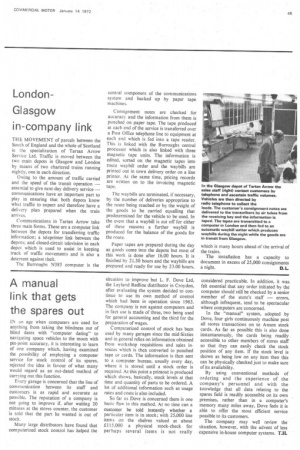London
Page 47

If you've noticed an error in this article please click here to report it so we can fix it.
Glasgow in-company link
THE MOVEMENT of parcels between the South of England and the whole of Scotland is the specialization of Tartan Arrow Service Ltd. Traffic is moved between the two main depots in Glasgow and London by means of two chartered trains running nightly, one in each direction.
Owing to the amount of traffic carried and the speed of the transit operation — essential to give next-day delivery service — communications have an important part to play in ensuring that both depots know what traffic to expect and therefore have a delivery plan prepared when the train arrives.
Communications in Tartan Arrow take three main forms. These are a computer link between the depots for transferring traffic information; a teleprinter link between the depots; and closed-circuit television in each depot which is used to assist in keeping track of traffic movements and is also a deterrent against theft.
The Burroughs N383 computer is the central component of the communications system and backed up by paper tape mac hines.
Consignment notes are checked for accuracy and the information from them is punched on paper tape. The tape produced at each end of the service is transferred over a Post Office telephone line to equipment at each end which is fed into a tape reader. This is linked with the Burroughs central processor which is also linked with three magnetic tape units. The information is edited, sorted on the magnetic tapes into route waybill order and the waybills are printed out in town delivery order on a line printer. At the same time, pricing records are written on to the invoicing magnetic tape.
The waybills are terminated, if necessary, by the number of deliveries appropriate to the route being reached or by the weight of the goods to be carried equalling that predetermined for the vehicle to be used. In the event that a waybill is cut off for either of these reasons a further waybill is produced for the balance of the goods for the route.
Paper tapes are prepared during the day as goods come into the depots but most of this work is done after 16.00 hours. It is finished by 21.30 hours and the waybills are prepared and ready for use by 23.00 hours, which is many hours ahead of the arrival of the trains.
The installation has a capacity to document in excess of 25,000 consignments
a night. DL.
















































































































